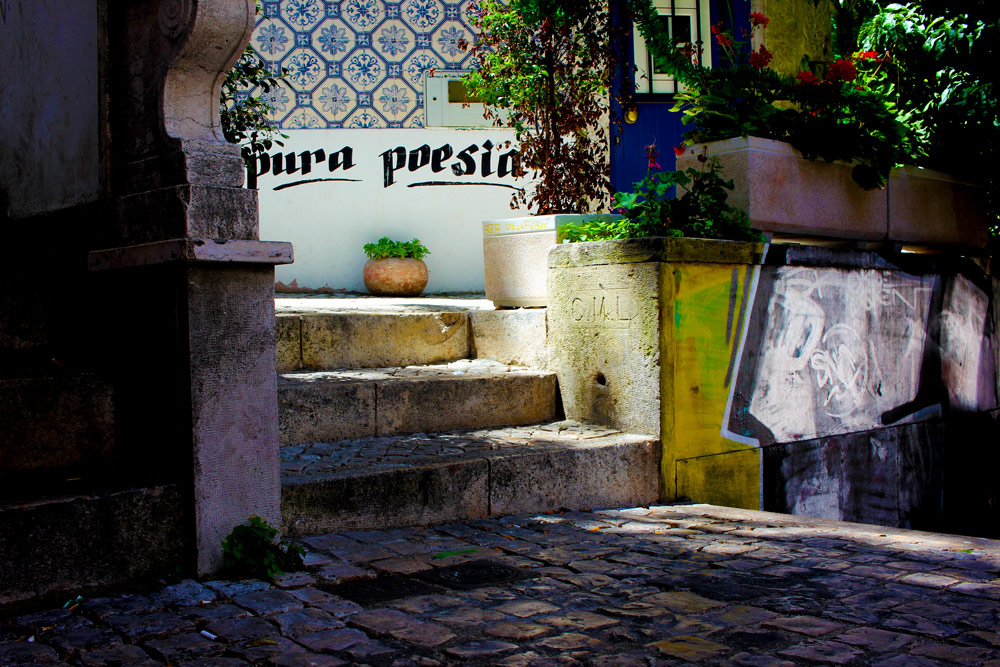Something is just too funny. I have no idea what it is, because I do not speak Portuguese, just working-class English and a piddling bit of pauvre Francaise.
The laughter in the hallway outside my room booms off the walls and through the doors. She cannot stop it, even though she is the head matron of the hostel and the buck stops with her. Her lips stick with a rich rouge, and her dark eyes pierce from behind a winged set of de-sophisting spectacles. Her laugh is close to climbing into my bunk and infecting me. Large parts of this city have tunneled under the bleeding defenses of my psyche through the barrels of a series of zoom lenses, so I suppose it couldn’t hurt to sprinkle a generous pinch of her mirth over the slow-cooked stockpot of salt and saudade I am quick reducing to. Laughter has been known to resemble a virulent disease14; I can only hope that hers continues to spread over the crevasses slowly saturating my braincase with empty space.
Lisbon, in my own small experience, is a world of “only.” The first time I showed up here, Denis Johnson visited with my class, commencing to quote Rilke in saying that “writing should change your life.” This city and the people I have known within it have visited an instant and indelible shift upon my existence, the only place I know of to ever do so. It is the only place with mirrored sidewalks, reflecting starlit dawn down the ruas to the port and star-crossed children all the way up to the Bairro Alto far too late at night. Those same paths are worn slick from the trapped tappings of an infinite flow of flaking tourists, a snaking skin that is continually shedding flawed stone scales, renewing itself piece by infinitesimal piece. The streets of Lisbon will swallow you whole, especially if you are wearing heels.

Lisbon is also the only place where my door tells me to wash myself twice before entering it.
The Living Lounge, the hostel where I am holed up, is an experience in and of itself; the room I am moving into after this one is called ‘Fado’ and was designed by men named Antonio and Pedro. The first time I stayed in it, I found myself hoping they were gay so I could cop a little extra feng shui. What I found was an advert under the glass of the end table for a queer dance club, two chiseled men in skimpy knickers asking with their eyes. It made me gay, but only in the second-finest sense of the word.
The lobby of the Living Lounge is the only place I’ve seen with a coffee table suspended from the ceiling, generally reserved for the high-wire suspense specific to drinking games. Johnson trafficked in a different type of suspense while instructing us, borrowing a phrase from Marvin Bell in telling that “a poem should only last as long as your fatal attraction to the subject.” I have spent the sleepless nights since I arrived here wondering if that means that I am doomed. In the subsequent early mornings, the head matron of the hostel and a few other women sit by the stove and gossip. I want to understand them, but my ignorance means that I can only imagine their conversations instead:
Three women trade bawdy jokes in a hostel kitchen, with a sink on the right and a stove built into an ancient fireplace on the left. There is a high, square table with barstools in the middle, and two rustic columns are adorned with recycling and ribbons at the forward ends of the open spaces. A grubby American male enters from right and begins to wash his dishes in the sink, reeking of cheap cigarettes from a long night trying to blow trees of smoke on the hostel balcony. The three women by the stove wrinkle their noses and hush their tones, speaking quickly back and forth in Portuguese. The sound of the police protesting the newly-installed Leftist government can be heard from the windows at the rear.
MARIA 1
He is too skinny. And he smells; he has been wearing those pants too long.
MARIA 2
Three days, I think. I saw him come out of the shower with them on two days ago.
MARIA 3
He needs to go back in the shower. He stinks like a fascist; he drinks like one too.
MARIA 2
I don’t like him. He took one of our dishtowels to wash his face.
MARIA 1
It’s just a dishtowel. He returned it before you came back to work. They are the softest we have here. You complain he is dirty and then complain when he cleans himself, too?
MARIA 3
You are crushing on him, aren’t you, Maria?
Maria 2 giggles vociferously at this revelation.
MARIA 1
I just think he needs to sleep more . . . It doesn’t mean I want to fuck him, Jesus.
MARIA 3
Stop lying. You would screw the salmon we ate for breakfast if it looked at you the right way.
MARIA 1
My husband has gotten old and lazy, what do you want from me? Everyone knows your sheets could use a little spice.
Maria 2 cackles with delight as Maria 1 flippantly sprinkles some salt into her batter and goes back to pouring and flipping crepes for other guests. The man flicks his hands into the sink before managing a weak smile at the women and exiting.
Curtain.
Mr. Johnson told me the last time I was in Lisbon that he wrote plays because they paid better than books. I can rest assured that the “3 Marias” are not paid enough for the work that they do, but I do know how a little “play” can help to redress their misogynized wage. I made them all chocolate covered strawberries and broken banana splits15 for lunch yesterday, with a ganache I made from apple juice, some dark and bitter stuff and a splash of dry gin. I said not one word. If my imagination is as absurd as usual, and they weren’t actually talking about me before, their eyes told me after that an impression had been made. They, like Denis Johnson, are almost too pleasant to exist, making everything they do look easier than it is. If I have helped them laugh as much as they have helped me cope with my unruly unconscious, then maybe a true cultural exchange will have taken place.

The matron continues chuckling softly as she keys her way into the room where I have been attempting to sleep.
She sees my noggin protruding from the top bunk and excuses herself in a fit of mumbles. I hug my duvet and curse my pillow of grainy cotton popcorn before someone else keys the door latch. I wonder if they have washed themselves like the door implores.
“Excuse me, erm, Mister Jared?” It is the front desk operator. His urbanity reminds me of my own lack, and I can smell that he has minded the exhortations of the door he has just opened. In reality, he smells only almost as nice as he is.
“Huh? I ask.
“You are scheduled to move to a different room, and we need to clean this one for the next guest, please. Checkout is right now.”
“Oh, shit.”
“It is no problem,” the operator says. “Just come see me at the front when you are ready.”
I stuff my feelings into my baggage along with the rest of my traveling possessions and walk up to the desk in my pajamas. I am almost embarrassed, but there is a man snoozing boozy drool16 onto the couch that makes me feel better about myself.
“Your new room will be ready at two,” the operator says. That is more than two hours from now. He begins to say something else, only to be interrupted by a command from down the hall. It is the matron. More of her imperious Portuguese follows, and the front desk operator furrows his brow.
“It seems your room is ready now. Please follow me,” he says. He walks down the hall and waves a hand toward the open door to my next abode. The matron is waiting inside, at center stage between the two bunk beds with her hands on her hips; the impossible height of her cheekbones has a dizzying effect. Despite their stature and her rowdy call down the hall, her voice is unsure now.
“Em, excuse me,” she says, “You are, em, a chef?”
“Uh, I was,” I say. A back injury forced my retirement. “It was good?”
“Oh, wow,” she responds. She makes circles with her thumbs and forefingers and pushes them at me with her other digits extended. “Muita obrigada,” she says. Only in Lisbon can I coax language-barriered blessings from boss ladies for my cooking, as there is no fanciness to the style I cook with at home. Her smile lightens my head so fast that she has swept out of the room before I can respond. She is always moving, like the legendary yellow trolley I see everywhere I go in the city. Little does she know I have enough product to make her a dozen more of those desserts stashed in the back of a low cabinet in her kitchen, and almost two more weeks of staying here to do it.
I slide my belongings into my footlocker and resolve not to unpack anything until I move into my old “Fado” room tomorrow. I’m the top bunk again, which means I get to make another blanket fort. Unfortunately, Lisbon is the only place where I make blanket forts. I try to sleep, but the entire first floor is abuzz with the sounds of itinerant travel and the winks I need elude me. I break my promise to myself, dress, and head down to the port square with my camera.
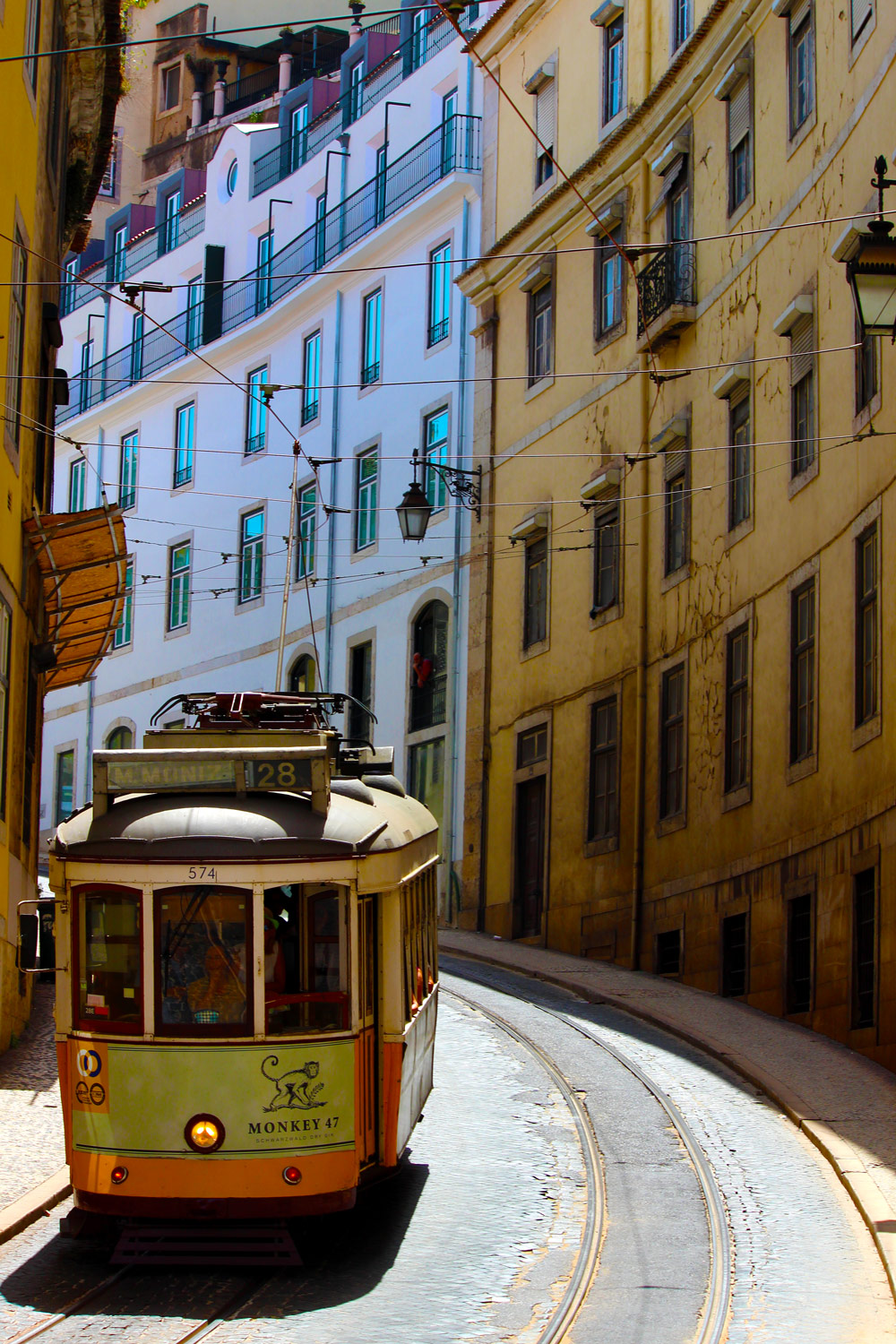
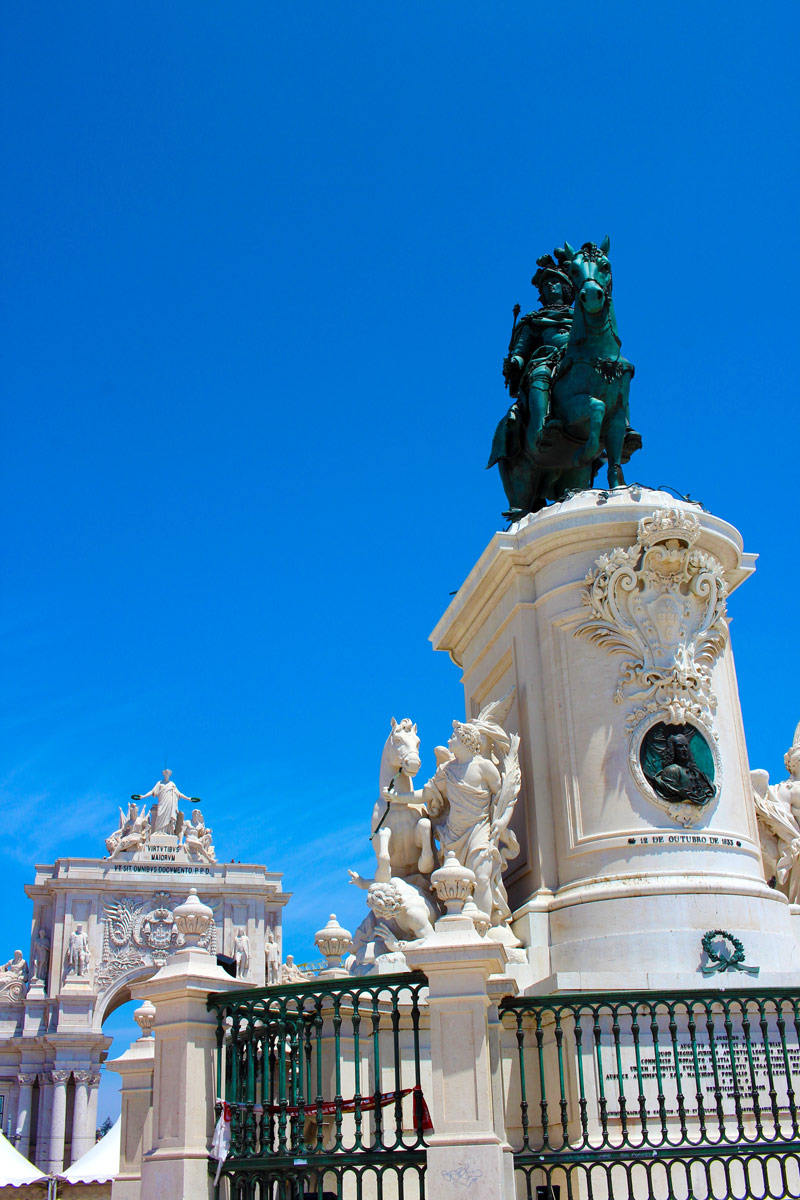
I just started making inedible visual art, and I picked up Salvador Dali’s 50 Secrets of Magic Craftsmanship at his eponymous museum in St. Petersburg to help get me up to speed.
His advice echoes Denis Johnson’s most well-known writing tips. Johnson is the only reason I came to Lisbon the first time. At the airport before my flight, I met someone with his words inked on their arm, inauspicious among many other hard-won works of art:
“And you, you ridiculous people, you expect me to help you.”
I perceive myself to be a rather a ridiculous person, and that woman at the airport would go on help me more than anything my wildest expectations ever could have cooked up, even after she discovered the wanderlusted whisperings that split my lips when I slept. One of the reasons I bought this camera was to record my unconscious, search for clues. So far, I have found out nothing but nonsense, punctuated by the occasional scream. None of the sounds I’ve captured are associated with any dream I can remember, so I have stopped documenting. When Johnson found out about the woman’s tattoo, he asked her to take a picture of it so that he could razz an old editor who had insisted on striking the line from the original story.
Johnson’s most famed writerly axiom is to “write naked,” to write things you could never say. Dali’s ego convinced him that he could say anything. He said that “I advise you to undress completely, for it is necessary for you to feel, as you are drawing, the design of your own body, as well as the august reality of the contact of your feet with the floor: for the man who knows how to draw and who, charcoal in hand, is able to draw what he wants, feels himself to become a kind of god—sensations of that kind I very strongly advise you to experience in a state of total nudity, rather than clothed17.” Whatever Johnson’s religious views may have been, I think it is safe to say he never possessed the pretense to become Dali’s “kind of god.” He was far too grounded for that. When I asked him why he and his delightful wife always sat separately at dinners with our student group, he said it was because she had heard all of his stories. He then recommenced chewing on his cigar and chuckling at me for having the temerity to ask him if he still gambled. My blood ran hot with shame for the rest of the evening, despite my best efforts to play it cool.
He also said to “write in blood,” referring to treating the craft as life-giving and scarce, as precious. Dali’s ego-soaked études stand cold and dry against the heaping help of Johnson’s humble pie in this case (Dali introduced his book by saying the best two things that could happen to an aspiring artist were that he be born in Spain and be named Dali, and that both things had, by a stroke of fate, happened to him). His idea of the body flows from the same fountain as Johnson, though: “[. . .] you must know this profound truth, that it is the body which gives soul to ideas [. . .] it is with the body that the soul forms ideas.18” If my body is what my soul uses to form ideas, then it’s like the matron and her ladies may have said: they don’t eat enough and they smell less than agreeable due to their long journey. Whether they have been wearing the same pair of pants for too long is a secret I find myself unable to divulge.
I arrive in the port square, a former royal palace that has been converted to a beer museum, among other touristy bullshit. I want to believe that the same king whose statue is on display in the middle of the square may have gifted his jilted mistress with a chapel and renamed the road leading to it Rua dos Remedias, Road of the Remedy; now the chapel is a restaurant that has launched the careers of numerous famous fadistas. In the room called ‘Fado,’ the room that I would really like to be in right now, records hang from the light fixture in the mode of flying saucers and the visage of Amália hangs from the walls. There is a book on the table whose title translates as “Amália in the world of Amália.” Amália’s world, from her sixth to her fifty-third birthday, was a world of fascism, the “Estado Novo19.” She became the all-time bestselling Portuguese artist of any stripe within that world. The matron’s cheekbones only rest almost as high as Amália’s. Amália existed in her time as “The Queen of Fado,” the foremost fadista under fascism. That is one of the many things that made her work so fabulously surreal, allowed her to push the boundaries of the performative Portuguese tradition with elements of opera and lines by Luís de Camões. The free memories she lamented in her music were those of a child; I believe that she used that excommunication from parts of herself to bridge the same gaps in others, just like Denis Johnson.
He invoked T.S Eliot to incorporate music into his work, borrowing Eliot’s idea that the craft was a quasi-musical exercise that amounted to a series of notes; that told me that any story, poem, or essay could be equated to a single long song. Amália’s career was only almost as long as Johnson’s entire life. Dali walked the earth longer than them both, living in separation from an elder brother he had been named after, one who had a died shortly before his conception of a stomach infection. It is rumored that Dali’s parents were never satisfied with him because he was, in fact, not his brother, even after he had become world famous. He sailed a much different tack in dealing with his intrapersonal exile than either Johnson or Amália, hiding his internal strife behind a veneer of insufferable pride at his own fame.
Amália’s sojourn to renown took her all over the world, made her the first Portuguese musician to appear on American television20, saw her original lyrics translated into myriad languages, and left her the first woman laid to rest in the Portuguese pantheon upon her death in 1999. Salazar and his endless tide of PIDE (Portuguese secret police) officers could not have exiled her if they tried, though they did persecute many of her favorite collaborators. Fado is, after all, all about visiting the places within oneself that cause the greatest fear.
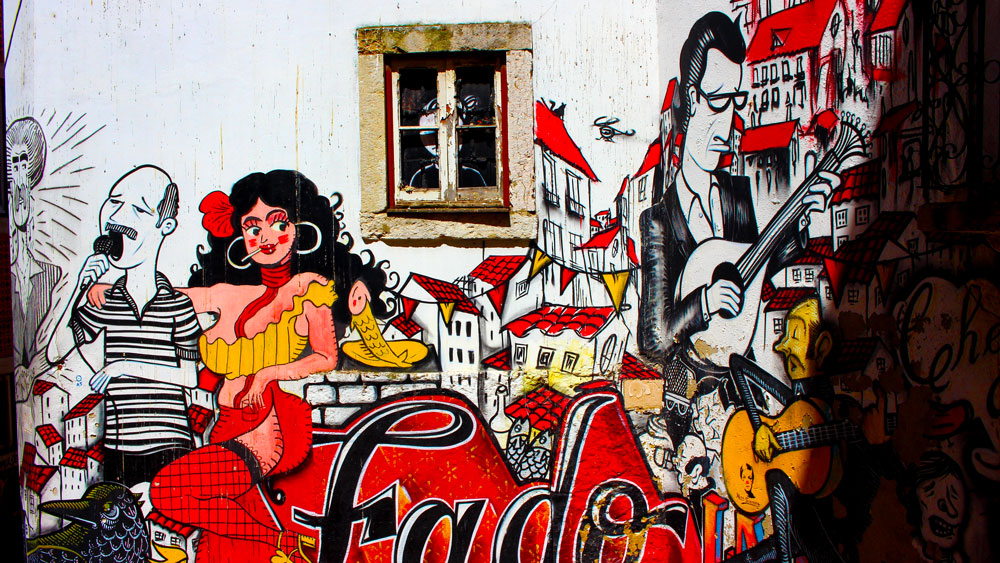
Johnson told that one should write from exile, like you fear that you’ll never get back to the place you are describing.
Edward Said defined exile as “the unhealable rift forced between a human being and their native place, between the self and it’s true home: It’s essential sadness can never be surmounted.” I did not ask for the essential authenticity of Portuguese saudade when I arrived here in Lisbon the first time, but that is what I seem to have gotten. I can say with confidence that Mr. Said was correct in positing that “exile is strangely compelling to think about, but terrible to experience21.”
Dali’s work in exclusion was much more limited, but no less valuable. He said that parties were thrown for those who are not invited, and to “make, therefore, a sharp division between your experiments and your work.22” I think he was talking about careful experimentation in the mixing of color before getting to the work of making art. It is wisdom that speaks to the real value of his treatise: to see into the mind of a craftsperson of such exacting dedication is a privilege, even if Dali’s ego did its best to occlude any truly human value he possessed. Johnson’s commitment to his work was just as palpable; he spoke in my class of revising at the “word level,” going beyond the line to polish paragraphs from a molecular perspective. Much like a molecule, Johnson’s ego remained exquisitely imperceptible, a foundational mixture of nuclear knowledge and electromagnetic movement I continue to have precious little experience with.
Dali knew that once color is mixed, one can never change it without erasing some transcendent stroke of luck somewhere else on the canvas, can never recover fully from that original mistake. He knew, basically, that if you fuck something up in the foundation, you are going to fuck other things up trying to fix it. I can attest to that. Nowhere in 50 Secrets does old Salvador mention any of his own mistakes, only those of a host of other painters. Dali had drunk so much of his own kool-aid when he wrote 50 Secrets that he even went so far as to offer extras, the last rendering all his other secrets moot if not true in an aspiring artist’s work:
“It is absolutely necessary, that at the moment you sit down before your easel to paint, your ‘painter’s hand’ is guided by an angel23.”
I think that the angel he referenced was his big brother. The fact that I want this advice to be true because Denis Johnson is dead is the most terribly selfish thing I have ever written, and I have written very many terrible and selfish things. I count myself lucky to have deleted most of them. The inky angel that guided me the last time I was here deleted me a long time ago, leaving me to solve for ways to disappear.
News of Johnson’s passing, less than a month before I was due to arrive again in the city where I met him, hit me in the same way as a flying spin kick to the face might have. I should know, because I watched one connect not far from this very riverbank just the other day. I was walking behind a mercado near dawn, dodging through the flowing waste of francophoned fuckheads descending from the Bairro Alto and realizing in real time what Amália meant when she said “Lisbon, Don’t Be a French.” her lyrics went (approximately) like this24:
Do not fall in love / flirt with the French / Oh, young girl Lisbon / Portugal is mild sometimes / but he doesn’t forgive certain things / Look at yourself in the mirror / of this honored old man / whose beautiful examples attract us / Go ahead, listen to his loyal advice: / Don’t bring sorrows to your father!
Lisbon, do not be a French / Because surely you won’t be happy this way / Lisbon, what an impish / and vain idea of yours / to marry Paris / Lisbon, here you have many suitors / Oh poor them! / with their soul in their voice, they say / “Lisbon, do not be a French” / “You are a Portuguese” / “You are meant only for us”
Show respect to our beautiful uniforms / Young girl Lisbon / Be care-full about whom you are keeping yourself for / An unmodest maid is so unpleasant / Here you have lieu-tenants at your disposal / Brave and valiant ones / Born and raised here / Go ahead, show more decent manners / Capricious bad girl
I had to read those translated lyrics to understand how salacious Salazar’s state-run sleaze really was, slithering into every crevice of the country’s exported expression over the course of his rule. I would not have sought them out if I knew it meant I would no longer be able to obliviously enjoy the pure vibrance of Amália’s voice, even as her sotto voce began to come through that much clearer. Just when I thought Lisbon was finally coming through clearly again, just when I thought I was beginning to recover my grip on reality, a beautifully-uniformed kerfuffle broke out near the garbage-binged market alley where I was experimenting in composition. A man in an expensive suit strolled down the street, slovenly from another soiree he had swilled a little too long. He was yapping at someone around the corner from the gutter where I was snapping pictures of Lisbon’s incongruous architecture.
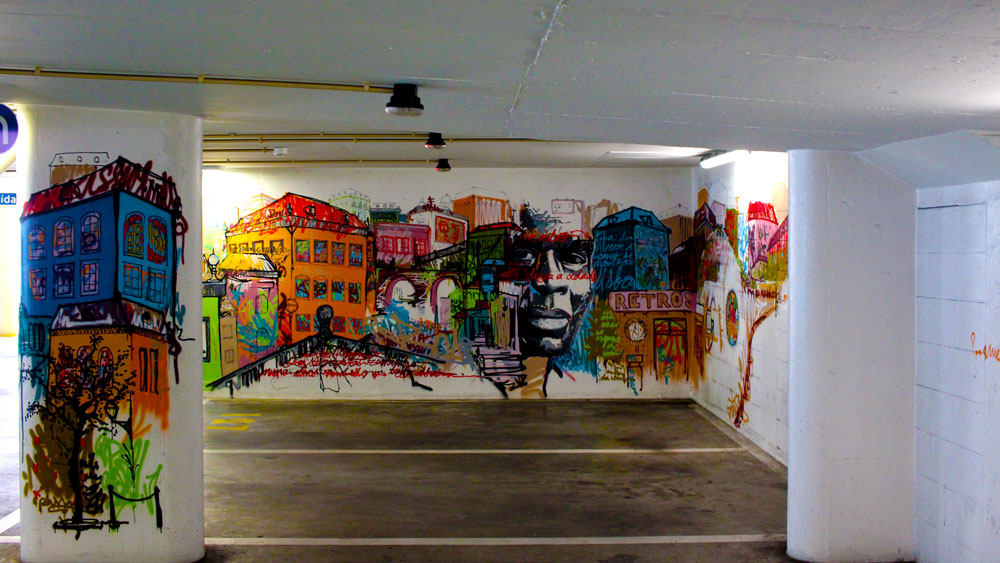
“Vous etes noir, vous etes sale!” the drunkard yelled.
I knew enough French from high school to understand him. ‘sale’ is pronounced ‘sul,’ like ‘sullied,’ like ‘dirty.’ He told the person around the corner to “chassé,” which I was pretty sure meant something close to sashay. I wondered why the moneyman was being so polite. The person he was insulting didn’t wonder at all, in my estimation; he ran his jeans and football jersey right at those expensive vestments and dropped the man inside like a skin suit with the top of his bare foot across a foreign jaw. He then took flight even faster than he had appeared in a masterpiece of surreal illusion that I think may be the closest I have ever come to an actual train dream.
I think Mr. Johnson would have been pleased with the result, knowing how he admired Isaac Babel’s desire for being both “economical and emotional.” It is safe to say that the man in the suit deserved what he got, in the same way that Dali deserves to be exhumed for a paternity test25. Those who have known Denis Johnson, even only momentarily like myself, can rest assured that he will rest forever easy in eternity. The best piece of advice he gave me, the wisdom I wish more than anything to pass on to others, is to take two unlike things and smash them together to create what he called an “unconscious question.” Upon saying this, he clapped his hands together, and the room fell into a stupor. If it wasn’t magic, it was very much something like it. I did not question it, just as I did not question the necromantic enchantment of finding myself smashed against another person more unlike myself than anyone I have ever met. I can say with a rather absolute certainty that she brought me back to life, well-versed as I was in death. To call her kindness an eternal largesse would be an understatement; whether she is a sea maiden is something you would have to ask her. I remain forever fortunate that we found ourselves in the same place at the same time, across an ocean from our homes and our former selves because we shared the desire to have the same book signed by the same author, a human being who will never grace the page with his pen again.
“The best piece of advice he gave me, the wisdom I wish more than anything to pass on to others, is to take two unlike things and smash them together to create what he called an ‘unconscious question.'”
As for that suited sadomasochist, departed as in death, only one word hung long and strong in the air among those of us who had witnessed his fleeting fall:
“Whoa.”
In my head, the only word left hanging was “Lisboa,” in part because it’s the only place I’ve ever seen Denis Johnson work the peaceful and generous justice of his personal sorcery in the flesh. That is only a dream now. Within, none of the monsters are laughing, not even me26.

Jared Alan Smith is a public educator operating out of Tampa, Florida. He is the founding prose editor of the magazine Obra / Artifact, and his work can be found in The Common, Burrow Press’ Fantastic Floridas reading series, and elsewhere. A free repository of his photography is on Instagram @xo_dust.
Get new stories sent to your inbox every Monday.
Drop your email below to start >>>
<<OR>> grab a print issue.
- Laughter remains one of the most mystifying and misunderstood neurological phenomena known to humankind, and it is often said that true mastery of a language only comes when the speaker can tell an effective joke in it. Source: Chapman, Anthony J. and Hugh C. Foot. Humor and Laughter: Theory, Research, and Applications. Transaction Publishers, Piscataway, 2007.
- You can find the recipe here.
- Dali wrote in 50 Secrets of Magic Craftsmanship that “it is undeniable that every good painter drools (p.93).”
- Dali, Salvador. 50 Secrets of Magic Craftsmanship, p. 122. New York, Dial Press, 1948
- Dali, Salvador. 50 Secrets of Magic Craftsmanship, p. 158-159. New York, Dial Press, 1948
- The Estado Novo, or Second Republic, began with the overthrow of the democratic First Republic on May 28th, 1926. The Carnation Revolution on April 25th, 1974 brought about the end of the authoritarian regime. There is anecdotal evidence to suggest that the timing of the revolution was brought on in some part by Amália’s hit song “April in Portugal.” Sources: www.brown.edu/Departments/Portuguese_Brazilian_Studies/ejph/html/issue2/pdf/baioa.pdf
prezi.com/oj_vrhyhaalm/fascism-in-portugal - For a more complete exploration of the groundbreaking intermodality of Amália’s works: www.all-about-portugal.com/amalia-rodrigues-queen-of-fado
- Said, Edward W. Reflections on Exile and Other Essays. Granta Books, London, 2012
- Dali, Salvador. 50 Secrets of Magic Craftsmanship, p. 139. Dial Press, New York, 1948
- Dali, Salvador. 50 Secrets of Magic Craftsmanship, p. 184. Dial Press, New York, 1948
- These lyrics were chosen specifically because of their imperfect nature, as translation is, at best, an imperfect exercise. Source: www.lyricstranslate.com/en/lisboa-nao-sejas-francesa-lisbon-dont-be-french
- Dali’s remains would exonerate him from tarot reader Pilar Abel’s claims to paternity, though his reputation for moral bankruptcy remains intact. Source: www.nytimes.com/2017/06/26/arts/design/salvador-dalis-corpse-exhumed-paternity-case
- All Photos provided courtesy of the author (Lisbon, 2017). He would like to extend crucial thanks to Wes Blake for sharing his notes from Denis Johnson’s 2014 DISQUIET fiction workshop lecture, from which many of the quotes in this essay are derived. The author’s notes were electronic, and have vanished into ephemera.
- Laughter remains one of the most mystifying and misunderstood neurological phenomena known to humankind, and it is often said that true mastery of a language only comes when the speaker can tell an effective joke in it. Source: Chapman, Anthony J. and Hugh C. Foot. Humor and Laughter: Theory, Research, and Applications. Transaction Publishers, Piscataway, 2007.
- You can find the recipe here.
- Dali wrote in 50 Secrets of Magic Craftsmanship that “it is undeniable that every good painter drools (p.93).”
- Dali, Salvador. 50 Secrets of Magic Craftsmanship, p. 122. New York, Dial Press, 1948
- Dali, Salvador. 50 Secrets of Magic Craftsmanship, p. 158-159. New York, Dial Press, 1948
- The Estado Novo, or Second Republic, began with the overthrow of the democratic First Republic on May 28th, 1926. The Carnation Revolution on April 25th, 1974 brought about the end of the authoritarian regime. There is anecdotal evidence to suggest that the timing of the revolution was brought on in some part by Amália’s hit song “April in Portugal.” Sources: www.brown.edu/Departments/Portuguese_Brazilian_Studies/ejph/html/issue2/pdf/baioa.pdf
prezi.com/oj_vrhyhaalm/fascism-in-portugal - For a more complete exploration of the groundbreaking intermodality of Amália’s works: www.all-about-portugal.com/amalia-rodrigues-queen-of-fado
- Said, Edward W. Reflections on Exile and Other Essays. Granta Books, London, 2012
- Dali, Salvador. 50 Secrets of Magic Craftsmanship, p. 139. Dial Press, New York, 1948
- Dali, Salvador. 50 Secrets of Magic Craftsmanship, p. 184. Dial Press, New York, 1948
- These lyrics were chosen specifically because of their imperfect nature, as translation is, at best, an imperfect exercise. Source: www.lyricstranslate.com/en/lisboa-nao-sejas-francesa-lisbon-dont-be-french
- Dali’s remains would exonerate him from tarot reader Pilar Abel’s claims to paternity, though his reputation for moral bankruptcy remains intact. Source: www.nytimes.com/2017/06/26/arts/design/salvador-dalis-corpse-exhumed-paternity-case
- All Photos provided courtesy of the author (Lisbon, 2017). He would like to extend crucial thanks to Wes Blake for sharing his notes from Denis Johnson’s 2014 DISQUIET fiction workshop lecture, from which many of the quotes in this essay are derived. The author’s notes were electronic, and have vanished into ephemera.

